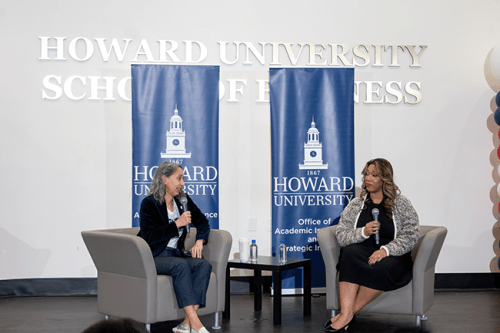WASHINGTON – Howard University Chemical Engineering Assistant Professor Solmaz Tabtabaei, Ph.D., recently received a four-year $450,000 grant from the National Institute of Food and Agriculture at the United States Department of Agriculture (USDA) to further her research into 3D food printing for legumes and cereals.
 “Ultimately my team’s goal is to develop eco-friendly bioseparation technologies for the production of novel plant-based protein-rich (3D) snack foods free of chemical residues with the aim of concurrently addressing major issues in sustainable energy, human nutrition, and the environment,” Tabtabaei says.
“Ultimately my team’s goal is to develop eco-friendly bioseparation technologies for the production of novel plant-based protein-rich (3D) snack foods free of chemical residues with the aim of concurrently addressing major issues in sustainable energy, human nutrition, and the environment,” Tabtabaei says.
Tabtabaei will examine certain behaviors that are observable during the implementation of a tribo-electrostatic separation, a technique used to classify legumes and cereals into their major constituents of protein and starch. She will utilize the resulting protein-enriched fractions as printing materials for extrusion-based 3D printing to produce nutritionally balanced protein snack foods.
The goal, Tabtabaei says, is to eliminate water consumption during the plant protein concentration process. With the results of her research work, Tabtabaei hopes to satisfy the growing demand for healthy novel plant protein food products. If successful, her findings may be able to positively impact the U.S. economy by changing the type of protein ingredients that are used for food production.
This research project has yet another invaluable goal: It will create research opportunities for Howard University chemical engineering undergraduate and graduate students and assist in diversifying the field of bioprocess and food engineering. Since Tabtabaei joined Howard University in Fall 2016, she has been awarded more than $750,000 in research grants from the National Science Foundation and USDA-NIFA-AFRI. She has also published several articles in peer-reviewed journals such as Food Chemistry, Powder Technology and Separation & Purification Technology.
The National Institute of Food and Agriculture (NIFA) provides leadership and funding for programs that advance agriculture-related sciences. We invest in and support initiatives that ensure the long-term viability of agriculture. NIFA applies an integrated approach to ensure that groundbreaking discoveries in agriculture-related sciences and technologies reach the people who can put them into practice.
About Howard University
Founded in 1867, Howard University is a private, research university that is comprised of 13 schools and colleges. Students pursue studies in more than 120 areas leading to undergraduate, graduate and professional degrees. The University operates with a commitment to Excellence in Truth and Service and has produced one Schwarzman Scholar, three Marshall Scholars, four Rhodes Scholars, 11 Truman Scholars, 25 Pickering Fellows and more than 165 Fulbright recipients. Howard also produces more on-campus African-American Ph.D. recipients than any other university in the United States. For more information on Howard University, visit www.howard.edu.
Media Contact: Sholnn Freeman, sholnn.freeman@howard.edu




